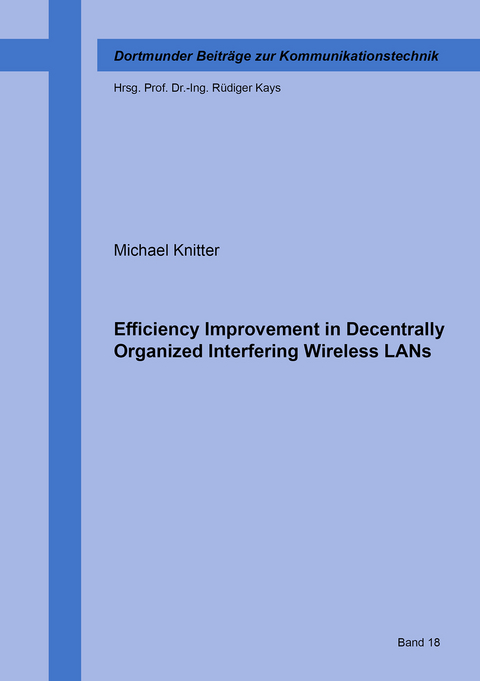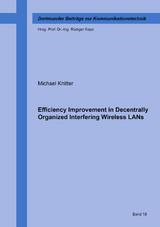Efficiency Improvement in Decentrally Organized Interfering Wireless LANs
Seiten
Market trends and user behavior changes lead to dense decentrally organized, interfering network environments. The dense interfering network environments limit user throughput and throughput growth. In such environments, the efficiency of WLANs needs to increase. This thesis discusses selected key topics impacting network efficiency like co-channel interference and channel access protocol overhead to introduce two measures in the spatial domain for increased WLAN efficiency by more parallel transmitting links.
The two measures leverage degrees of freedom from the power and the spatial domain. The first measure is an enhanced spatial reuse (SR) model, which fully utilizes the SR potential of a given network scenario. The second measure uses spatial division multiplexing (SDM) techniques, but across Networks (SDMXBSS), to cancel co-channel interference. With a sufficient number of antenna resources, SDMXBSS is capable of building interference free networks, denoted as a virtual wireless switch.
The thesis includes extensive performance and robustness evaluation for SR, SDMXBSS and for the combination of both measures, SDMSR.
To allow an implementation of SR and SDMSR to existing decentral networks, the thesis introduces the channel access protocols CSMA/SR and CSMA/SDMSR.
Simulations evaluate the effectiveness of CSMA/SR and CSMA/SDMSR for three representative scenarios and different resource and channel configurations, compared to CSMA/CA. The simulations prove that the introduced concepts deliver a significant improvement in terms of increased system throughput and reduced latency to finally improve the efficiency of decentrally organized wireless LANs.
The two measures leverage degrees of freedom from the power and the spatial domain. The first measure is an enhanced spatial reuse (SR) model, which fully utilizes the SR potential of a given network scenario. The second measure uses spatial division multiplexing (SDM) techniques, but across Networks (SDMXBSS), to cancel co-channel interference. With a sufficient number of antenna resources, SDMXBSS is capable of building interference free networks, denoted as a virtual wireless switch.
The thesis includes extensive performance and robustness evaluation for SR, SDMXBSS and for the combination of both measures, SDMSR.
To allow an implementation of SR and SDMSR to existing decentral networks, the thesis introduces the channel access protocols CSMA/SR and CSMA/SDMSR.
Simulations evaluate the effectiveness of CSMA/SR and CSMA/SDMSR for three representative scenarios and different resource and channel configurations, compared to CSMA/CA. The simulations prove that the introduced concepts deliver a significant improvement in terms of increased system throughput and reduced latency to finally improve the efficiency of decentrally organized wireless LANs.
| Erscheinungsdatum | 25.01.2022 |
|---|---|
| Reihe/Serie | Dortmunder Beiträge zur Kommunikationstechnik ; 18 |
| Verlagsort | Düren |
| Sprache | englisch |
| Maße | 148 x 210 mm |
| Gewicht | 374 g |
| Themenwelt | Sozialwissenschaften ► Kommunikation / Medien |
| Technik ► Nachrichtentechnik | |
| Schlagworte | IEEE 802.11ax • Interference Cancellation • Spatial Division Multiplexing • Spatial Reuse |
| ISBN-10 | 3-8440-8412-6 / 3844084126 |
| ISBN-13 | 978-3-8440-8412-2 / 9783844084122 |
| Zustand | Neuware |
| Haben Sie eine Frage zum Produkt? |
Mehr entdecken
aus dem Bereich
aus dem Bereich
Buch | Softcover (2024)
Wiley-VCH (Verlag)
CHF 25,20




